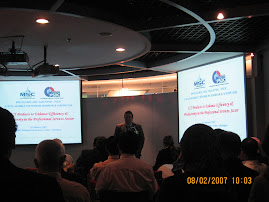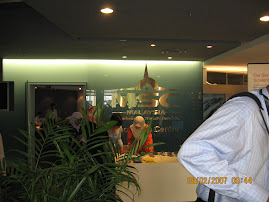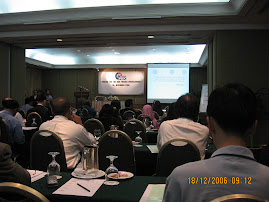On June 4th 2008, the Malaysian Government announced, among others, that the Malaysian petrol pump price will go up 78 sen from RM1.92/litre to RM2.70/litre - a whooping 41% rise effective June 5th 2008.
It was reported that the new policy carries a 30 sen subsidy to the market price of Malaysian petrol (currently deemed at RM3/litre). And this 30 sen subsidy will be maintained every month when monthly review/adjustment is made to the petrol pump price: so that if the market price for petrol is, say, RM3.30/litre next month, the pump price will be adjusted to RM3/litre (i.e. RM3.30 less 30 sen); but, if the market price is RM2.80/litre, the pump price will be lowered to RM2.50/litre for that month.
The question of great public interest is therefore: How is this market price of Malaysian petrol arrived at - both for June 5th 2008 and every monthly review thereafter - to calculate the petrol pump price? What is the formula used? Will it be made known to the public?
Two other features of the new petrol pump price policy that many Malaysians may have mis-givings are:
1) Foreigners who drive their cars into Malaysia will (correct me if I'm wrong) also enjoy the 30 sen petrol subsidy. Why are we allowing this to happen? Why can't we plug this financial leakage and use the money for the benefits of Malaysians? The subsidy to the foreigners must stop!
2) The rebates to be given to the Malaysian private car owners appear to be not limited to 1 private car per owner - no matter how many private cars he/she owns. That means to say if a rich Malaysian owns a few private cars, say 5 cars, that qualify for cash rebates - in terms of car capacity and type (pick-up, jeep, etc.) - each of his/her 5 cars would entitle him/her to receive cash rebates. This appears to be subsidising the rich more than it should quite contrary to earlier public statements that the subsidy would only go to the poor and the lower middle income - the needy!
I am of the view that for every Malaysian who owns more than 1 private cars that qualify for cash rebates, only 1 of his many private cars entitles him to the cash rebate! It is not right at all that the more private cars he owns, the more cash rebates he recieves! The current policy is therefore seen as favouring the rich!
Another feature that the Malaysian public may not be happy about is that the policy is blatantly inflation-fuelling or pro-inflation. Why couldn't a more subtle, sophisticated or inflation-neutral approach be used?
Such an approach can involve smart chips in MyCards as suggested in my earlier posting. That approach could maintain the current petrol pump price of RM1.92/litre up to a certain litres/qouta a month for each Malaysian private car owner (regardless of how many cars he/she owns) beyond which the full market price applies. The beauty of such an approach are, namely:
- that it gives less legitimacy/reason for others to hike their prices - it is therefore not inflation-fuelling; rather, it is inflation-neutral;
- that it ensures zero subsidy for foreigners - no financial leakage/wastage;
- that no matter how many private cars a rich Malaysian owns, he enjoys only the same amount or quota of subsidised petrol just like the average or poor Malaysian private car owners;
- that the rich enjoy subsidised petrol mainly in theory only. In practice, the rich would most probably not enjoy any subsidised petrol at all because the rich would most probably not bother to give their MyCards to chauffers to slot into petrol pump readers just to enjoy subsidised petrol for say only 200 litres out of probably more than a thousand litres their many cars easily used every month. But politically, at least, the rich are not in theory and wouldn't in practice feel being discriminated on subsidised petrol entitlement!
The MyCard approach or its conceptual equivalent deserves serious reconsideration.
Anyway, what can the Malaysian real estate marketers do now to cushion the unprecedented 41% rise in core expenses of their livelihood? My 2-sen suggestions:
- Focus on marketing real estate near to where you live or where your office is located. Do not spread yourself too far and wide unless it is a high-ticket deal;
- Devote day-time to offline real estate marketing and night-time or free-time to Internet Marketing (http://www.gt-ibiz.com/ can help you on this - just use your credit card to pick up an affordable web hosting package with free site builder (won't be more than RM250) and start acquiring life-time Internet marketing skills now) or other secondary income sources you can think of;
- that you plan your trips to prevent unnecessary petrol wastage;
- that the 5% Service Tax threshold be raised from zero to say RM2.5 million - if the association for restaurants and eateries can raise theirs from RM500,000 to RM5 million, is there any reason why the threshold for professionals should be lowered to zero recently? Aren't resource-rich Malaysians being subjected to far too many sources of direct and indirect taxation - tolls included. Professional associations must work just as hard on this!
- that our professional fee be increased with urgency since the prices for many items have increased a lot for the past 1 year and will continue to rise sharply in days and weeks to come;
- that the proposed TNB tariffs hike in July (next month) should be aborted. Why shouldn't TNB that made good profits for the past few years be asked - just like the school bus operators, hawkers, etc. were asked - not to hike its tariffs following the unprecedented price hikes? TNB's financial wellbeing should not be considered as more sacrosanct than those of the ordinary traders and commercial entities.
For the general wellbeing of the people everywhere, shouldn't utilities essential for livelihood/earning a living such as water, electricity, fuels, sewage disposal should be nationalised instead of privitised for commercial gains? Shouldn't the governments the world all over provide these basic utilities at costs to their citizens and their local businesses so as to keep their local costs of living and doing businesses down and therby improve their purchasing power, profitability and hence quality of life as well as taxation accrued to the governments?
When costs are high, profits are low or in the red, giving tax reliefs are not helpful at all to those aggrieved by the unprecendented price hikes.
The next few days and weeks will be interesting to watch as the unprecedented petrol price hikes amid skyrocketing rice and food prices bite into the livelihoods of ordinary folks. We can only pray for goodsense and wisdom to prevail over this once blessed country of ours. Perhaps it's time now to form and activate a special Crisis Management Team that will meet daily for strategies to combat the prevailing skyrocketing prices of fuels, foods and almost everything - lest our beloved country may never be the same again!
Views and comments, please.
Douglas.
(2nd Update dated June 16, 2008)






No comments:
Post a Comment